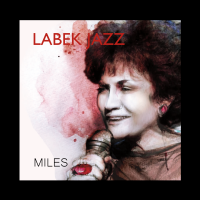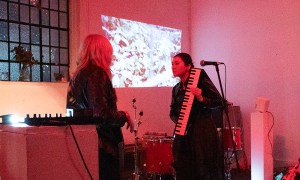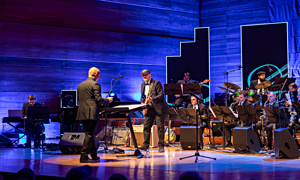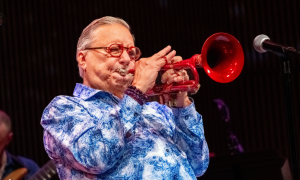Home » Jazz Articles » Live Review » Ottawa Jazz Festival Day 3: June 23, 2007
Ottawa Jazz Festival Day 3: June 23, 2007
Music is one of the few areas where, health permitting, the advancing years can hold a distinct advantage. Some artists continue to hone the craft they've spent a lifetime working on; others demonstrate that the passing of time needn't foreclose looking forward; still others are rigid in their insistence that things were better in years past. Day three of the TD Canada Trust Ottawa International Jazz Festival focused on two senior citizens of jazz piano—the octogenarian Dave Brubeck and near-octogenarian Junior Mance. The emphasis may have been on the mainstream, but both performances were outstanding examples of two artists who remain at the top of their game.
Chapter Index
When Library and Archives Canada's master of ceremonies for the Connoisseur Series Randall Ware announced Junior Mance to the capacity crowd, he introduced him as "Julian Clifford Mance," taking the pianist by surprise. "Nobody's ever introduced me like that," he said, "though these days some people do introduce me as Senior Mance." He may be 78 years old, and a little slower to get to the piano bench, but the appreciative and jocular Vance was clearly happy to be there. Backed by two Ottawa musicians—bassist Sol Gunner and drummer Glenn Robb—he wasted no time in getting to an eighty-minute set that swung from start to finish. The repertoire was largely standards, but it's one thing to hear artists regurgitate tired versions of timeworn material; it's another to hear a legend who helped establish them as standards.
Mance's long career has seen him perform with everyone from Lester Young, Gene Ammons and Sonny Stitt to Clifford Brown, Dinah Washington and Dizzy Gillespie. Still, the pianist has spent the majority of his life leading his own trios, and while his contribution to the standards book is relatively small, at least one song—the gospel-inflected "Jubilation"—is a true classic.

Watching Mance perform on the same Steinway (originally belonging to Glenn Gould), a day after Joey Calderazzo's impressive performance, was an education in just how differently two pianists can sound on the same instrument. More than just the material, the chords and phrases, it's all about touch. Calderazzo had commented on the "light action" of the instrument, and his set revolved around a light touch. Mance plays harder, drawing a stronger, deeper tone out of the instrument. That's not to say he wasn't elegant, delicate or capable of subtlety, but his tone reflected a more forceful attack.
Given that Gunner and Robb hit the stage running with little-to-no rehearsal, they did a fine job supporting Mance. There were a few rough edges, and a few metrical slips here and there but, for the most part, they kept up with Mance, who clearly approaches the material from a different perspective with each performance, keeping the bassist and drummer on their toes throughout. Highlights of the show included a soulful rendition of Hoagy Carmichael's enduring "Georgia on My Mind," Benny Golson's equally classic "Whisper Not" and the deceptively simple "A Single Petal Of A Rose," from Duke Ellington's "The Queen Suite" (1959). Mance's solo introduction to the latter, in particular, was an instructive lesson on exploration while still remaining true to form.
Mance ended the set with a buoyant rendition of Ellington's ubiquitous "Take the 'A' Train," but with the audience refusing to let him leave without an encore, he satisfied more than a few fans that had come to hear "Jubilation." It was a fitting high note on which to end a set that may have been thoroughly in the tradition, but was unequivocal proof that when well-heeled material is played with total commitment and spontaneity it remains absolutely timeless. class="f-right">
Dave Brubeck
When an artist like Dave Brubeck comes to town, even the most casual of jazz fans is sure to attend. With nearly ten thousand fans at Confederation Park—the best attendance so far and likely to be the record- setter for the 2007 festival—that was clearly the case here. Like Mance, the 86-year-old Brubeck may have taken his time to get to his piano, but his performance made it clear that not only has he not lost his spark, but he's an artist who has continued to evolve over the course of his sixty-plus year career.

While Brubeck has collaborated with other well-known artists including Gerry Mulligan and Duke Ellington, the overwhelming percentage of his extensive discography has been as a leader. Many of Brubeck's concepts—especially those formed during his lengthy association with the late altoist Paul Desmond—are such a part of the fabric of jazz today that it's easy to forget just how innovative they were at the time. It's altogether likely that musicians today would still be working with irregular meters, but when The Dave Brubeck Quartet released Time Out (Columbia, 1959)—the second biggest-selling jazz record next to Miles Davis' Kind of Blue (Columbia, 1959)—featuring the pianist's stylistic and ethnic cross- pollination of "Blue Rondo à la Turk" and the 5/4 time of Desmond's even more ubiquitous "Take Five," it was a shot heard around the world. Jazz in particular, and music on a broader scale, would simply never be the same.
Brubeck was also an innovator in the use of polyrhythms (combining two or more rhythms) and polytonality (playing in two or more keys simultaneously), and has shaped a career that's always been about looking ahead. Still, for his Ottawa performance the pianist largely mined the standards repertoire with a crack quartet featuring the remarkable altoist/flautist Bobby Militello, supple bassist Michael Moore and flexible drummer Randy Jones. There may have been few hairs that weren't gray amongst the foursome, but they played with youthful energy tempered by the wisdom of age and experience.
Brubeck's characteristically dense playing was in full view, though he also demonstrated an unexpectedly spare, Basie-like economy throughout the performance. Carefully constructing his solos as always, his a capella intro to the classic "Stormy Weather" was a highlight; a focused blend of traditional and contemporary harmony.
Moore is a rarity among jazz bassists, soloing as effectively arco as he does pizzicato. As an accompanist, his relaxed sense of swing dovetailed perfectly with Jones, who stayed largely in a support role for most of the set but delivered an unexpectedly powerful and imaginative solo when Brubeck pulled out "Take Five," towards the end of the set.

The real surprise of the show, however, and an artist who remains curiously off the radar of too many jazz listeners, was Militello. He may play the same horn as Desmond (alto), but there the similarity ends. Desmond was the epitome of cool, while Militello's solos were anything but. With a sound that was, oftentimes, gritty and blues-oriented, he raised the energy level every time he took a solo—even on the ballads. Young enough to have absorbed more modernist harmonic concepts, he helped drive "Take Five" to unexpected places, phrasing the familiar theme in an unequivocally personal way that was reverent to the seminal Desmond version but at the same time fresh and modern.
It was "Take Five," in fact, that demonstrated just how much real artistry never sits still. There was enough of the familiar to please the expectant crowd, but the quartet approached it with open ears and minds. Along with Jones' crowd-thrilling solo, Moore played liberally with the core riff, and Brubeck's harmonies were far more abstract than those heard on the original recording. While there are those who feel the need to regurgitate literal renditions of familiar tunes to an audience, Brubeck made it clear that, though he was more than happy to satisfy his fans, it would be on nothing short of his own terms.
Tomorrow: Renee Rosnes Trio and Bill Frisell.
Visit Junior Mance, Dave Brubeck and the TD Canada Trust Ottawa International Jazz Festival on the web.
Photo Credit
John Fowler
Day 1 | Day 2 | Day 3 | Day 4 | Day 5 | Day 6 | Day 7 | Day 8 | Day 9 | Day 10 | Day 11
Tags
PREVIOUS / NEXT
Support All About Jazz
 All About Jazz has been a pillar of jazz since 1995, championing it as an art form and, more importantly, supporting the musicians who make it. Our enduring commitment has made "AAJ" one of the most culturally important websites of its kind, read by hundreds of thousands of fans, musicians and industry figures every month.
All About Jazz has been a pillar of jazz since 1995, championing it as an art form and, more importantly, supporting the musicians who make it. Our enduring commitment has made "AAJ" one of the most culturally important websites of its kind, read by hundreds of thousands of fans, musicians and industry figures every month.






















